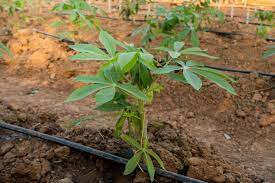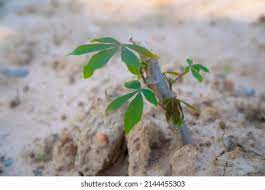Cassava shoots refer to the young and tender growth of the cassava plant (Manihot esculenta). Cassava is a tropical and subtropical root crop known for its starchy tuberous roots, which are a significant source of carbohydrates in many parts of the world. While the roots are the most commonly consumed part of the cassava plant, the shoots also have culinary and agricultural importance.
Cassava shoots are green, leafy, and typically have a pointed or lanceolate shape. They grow from the top of the cassava plant’s main stem and form a cluster of leaves. Cassava shoots can vary in size but are generally smaller and more tender than mature cassava leaves. They can range from a few inches to several feet in length.
The shoots have a tender and somewhat succulent texture, making them suitable for various cooking methods. Cassava shoots have a mildly bitter and slightly earthy taste, which can become milder when cooked. The flavor is somewhat similar to spinach or other leafy greens.
Cassava shoots are used as a vegetable in various cuisines, primarily in regions where cassava is a staple crop. They are often added to soups, stews, stir-fries, and salads. Cassava shoots can be boiled, steamed, sautéed, or used in traditional dishes. Cassava shoots are a good source of essential nutrients, including vitamins A and C, as well as minerals like calcium, iron, and potassium. They also contain dietary fiber.
Cassava shoots also play a role in cassava farming. They are sometimes used for propagation when farmers want to cultivate new cassava plants. Shoots can be cut from a mature cassava plant and planted to grow new cassava crops.
Cassava shoots are the young, green, and tender leaves of the cassava plant. They are a valuable vegetable in regions where cassava is a staple crop and provide essential nutrients when properly prepared. However, due to their cyanide content, it’s crucial to cook them thoroughly before consumption.
The Economic Importance and Uses of Cassava Shoots

Cassava is a tropical root crop that is primarily grown for its starchy tuberous roots, which are a significant source of carbohydrates in many developing countries. However, cassava shoots, the young, tender shoots that grow from the cassava plant, also have economic importance and various uses.
Here are some of the economic importance and uses of cassava shoots:
1. Food Source: Cassava shoots are edible and can be used as a source of nutrition, especially during periods when the cassava tubers are not yet ready for harvest. They are consumed in various ways, including in soups, stews, and salads.
2. Traditional Medicine: In some cultures, cassava shoots are used in traditional medicine to treat various ailments. They may be used to make herbal remedies for conditions like hypertension, inflammation, and digestive issues.
3. Livestock Feed: Cassava shoots can be used as animal feed, providing a source of nutrition for livestock such as cows, goats, and pigs. They are a valuable forage resource, especially in regions where other feed sources are limited.
4. Pest Control: Cassava shoots contain compounds that are toxic to certain pests. Some farmers use cassava shoots as a natural pesticide by incorporating them into their farming practices to protect crops like maize and cassava itself from pest infestations.
5. Soil Improvement: Cassava plants, including their shoots, can help improve soil fertility. The leaves and stems can be used as green manure when they are incorporated into the soil, contributing organic matter and nutrients.
Read Also: Cassava Petioles: Economic Importance, Uses and By-Products
6. Erosion Control: Cassava plants, including the shoots, have an extensive root system that can help prevent soil erosion. Planting cassava shoots on slopes or in areas prone to erosion can help stabilize the soil.
7. Crop Rotation: Cassava shoots can be grown as part of a crop rotation system. Growing cassava shoots in between other crops can help break pest and disease cycles and improve overall soil health.
8. Income Generation: Farmers can generate income by selling cassava shoots as a vegetable or for animal feed. This diversification of income sources can improve the economic resilience of farming households.
9. Research and Breeding: Cassava shoots are essential for cassava breeding programs. Researchers use the shoots to develop new cassava varieties with improved traits such as pest resistance, higher yield, and better nutritional content.
10. Culinary Diversity: Cassava shoots can add culinary diversity to diets in regions where cassava is a staple crop. They are used in various traditional dishes and can be an important ingredient in local cuisines.
The Products and By-products That Can Be Derived From Cassava Shoots
Cassava shoots, also known as cassava stems or cassava cuttings, can be a valuable source of various products and by-products. Cassava (Manihot esculenta) is a tropical root crop primarily grown for its starchy tuber, but its shoots can also be utilized for various purposes.
Here is a list of products and by-products that can be derived from cassava shoots, along with explanations:
1. Cassava Leaves: Cassava leaves are the most common and valuable product obtained from cassava shoots. They are rich in protein, vitamins, and minerals and are commonly used in various culinary preparations, such as soups, stews, and salads in many African and Asian countries.
2. Animal Feed: Cassava shoots can be used as animal feed for livestock and poultry. They provide a source of nutrition and can help reduce the cost of animal feed production.
3. Green Manure: Cassava shoots can be incorporated into the soil as green manure or cover crops. This helps improve soil fertility by adding organic matter and nutrients, enhancing soil structure and moisture retention.
4. Biomass for Energy: Cassava shoots can be processed into biomass fuel, such as pellets or briquettes, which can be used for cooking or as an alternative source of renewable energy.
5. Medicinal Uses: In some traditional medicinal practices, cassava shoots are used to treat various ailments. However, caution should be exercised, as cassava contains toxic compounds that need to be properly processed to make them safe for consumption.
Read Also: 25 Medicinal Health Benefits of Cardiospermum halicacabum (Balloon Vine)
6. Ethanol Production: Cassava shoots can be used in the production of bioethanol, which can be used as a biofuel or as an industrial solvent.
7. Extraction of Natural Pesticides: Cassava shoots contain compounds that can be extracted and used as natural pesticides to protect crops from pests and diseases.
8. Production of Cassava Stems for Planting: Cassava stems obtained from mature shoots can be used for planting new cassava crops. These stems serve as the planting material for cassava propagation.
9. Composting Material: Cassava shoots can be added to compost piles to accelerate the decomposition process and create nutrient-rich compost for agricultural use.
10. Paper Production: The fibers extracted from cassava shoots can be used in the production of paper products, providing a potential alternative to wood-based paper.
11. Biodegradable Products: Cassava starch obtained from the tubers can be used to produce biodegradable products such as packaging materials and utensils.
In conclusion, important to note that while cassava shoots offer various opportunities for utilization, they also contain toxic compounds, primarily cyanogenic glycosides. Proper processing, such as peeling, soaking, and cooking, is necessary to detoxify cassava shoots before consumption or use. Additionally, local practices and regulations may influence the specific products and by-products derived from cassava shoots in different regions.
Read Also: Old Mattress (Mattress Wastes) Money Making Complete Guide

